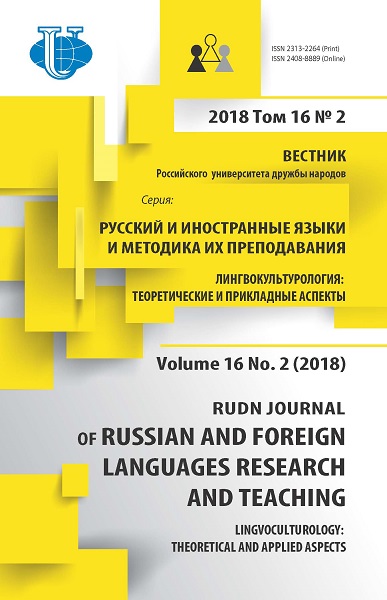Features of adaptation of foreign students to the Russian linguo-cultural and educational environment
- Authors: Fedotova N.L.1, Miller L.V.2
-
Affiliations:
- St.-Petersburg State University
- Emperor Alexander I St. Petersburg State Transport University
- Issue: Vol 16, No 2 (2018): LINGVOCULTUROLOGY: THEORETICAL AND APPLIED ASPECTS
- Pages: 191-206
- Section: Cultural Linguistics: Theoretical and Applied Aspects
- URL: https://journals.rudn.ru/russian-language-studies/article/view/18557
- DOI: https://doi.org/10.22363/2313-2264-2018-16-2-191-206
Cite item
Full Text
Abstract
The article describes the factors that influence the processes of socio-psychological and sociocultural adaptation of foreign students receiving education in a second language in terms of the culturally alien environment. The adaptation process is considered in two interrelated coordinate systems: the student - his/her socio-cultural environment and student - educational environment, in which he included natural way. Socio-cultural adaptation of a foreign student is a multi-step process that includes: 1) dosed directly related to the motivational sphere of the student’s receipt of information about the culture of the country of the target language; 2) development of the ability to correct interpretation of specific manifestations of communicative behavior of Russian; 3) the formation of practical skills of educational professional and cultural-everyday communication with Russians. The authors substantiate the position that the process will be less painful and more effective if: a) to make it manageable; b) to develop a set of measures to prevent failures in communication and to remove the psychological tension, which is due to the influence of other cultures.
About the authors
Nina Leonidovna Fedotova
St.-Petersburg State University
Author for correspondence.
Email: n.fedotova@spbu.ru
Doctor of Pedagogy, Professor, Faculty of Philology, Federal State Budget Educational Institution of Higher Education “St. Petersburg State University” (Russia). Research interests: methods of teaching Russian as a foreign language, teaching of foreign pronunciation, psycholinguistics, testing. The author of more than100 scientific articles
7/9, Universitetskaya Emb., St. Petersburg, 199034, Russian FederationLyudmila Vladimirovna Miller
Emperor Alexander I St. Petersburg State Transport University
Email: ludmilavmiller@mail.ru
Doctor of Philology, Professor, Federal State Budget Educational Institution of Higher Education “Emperor Alexander I St. Petersburg State Transport University” (Russia). Research interests: cross-cultural communication, methods of teaching Russian as a foreign language, professionally oriented teaching Russian to students of technical specialties. The author of 50 scientific articles
9, Moskovskiy pr., St. Petersburg, 190031, Russian FederationReferences
- Berry, J.W. (1997) Immigration, acculturation and adaptation. Applied psychology: An international review. 46 (1), 5—34. (In Russ).
- Elizarova, G.V. (2000). Kulturologicheskaya lingvistika (opyt issledovaniya ponyatiya v metodicheskikh tselyakh) [Culturological linguistics (the experience of the study of concept in teaching aim)]. Saint Petersburg: House «Belveder» Publ. (In Russ).
- Fress, P. & Piazhe, J. (1975). Motivatsiya. Eksperimentalnaya psihologiya [Motivation. Experimental psychology]. Moscow: Progress Publ. (In French — In Russ).
- Fumadelles, M. (1971). Motivation et enseignement des langues. Les langues vivantes. (In French).
- Gruzdev, G. & Gruzdeva, V. (1996). Pedagogicheskaya tekhnologiya evristicheskogo tipa. Vysshee obrazovanie v Rossii [Pedagogical technology of heuristic type. Higher education in Russia]. 1, 117—120. (In Russ).
- Karlinskiy, A.E. (1990). Osnovy teorii vzaimodeystviya yazykov [Fundamentals of the theory of the languages interaction]. Alma-Ata: Gyilyim Publ. (In Russ).
- Kin, Ch. (2014). Tips for International Students’ Success and Adjustment. International Student Experience Journal. 2(1), 345—349. (In Eng).
- Kravtsov, A.V. (2008). Sotsialno-psikhologicheskaya adaptatsiya inostrannykh studentov k vysshei shkole Rossii [Socio-psychological adaptation of foreign students to Russian universities]. [Author’s abstr. cand. psihol. diss.]. Moscow. (In Russ).
- Lebedeva, N.M. (1999). Vvedenie v etnicheskuyu i kross-kulturnuyu psikhologiyu [Introduction to ethnic and cross-cultural psychology]. Moscow: Klyuch-S Publ. (In Russ).
- Leontovich, O.A. (2005). Russkie i amerikantsy: paradoksy mezhkulturnogo obscheniya [Russians and Americans: paradoxes of intercultural communication]. Moscow: Gnozis Publ. (In Russ).
- Lyubimova, N.A. (2006). Foneticheskii aspekt obscheniya na nerodnom yazyike: kollektivnaya monografiya. [The phonetic aspect of communication in a second language: Collective monograph]. Saint Petersburg: Filologicheskii fakultet SPbGU Publ. (In Russ).
- Nyutten, Zh. (1975). Motivatsiya. Eksperimentalnaya psihologiya [Motivation. Experimental psychology]. Moscow: Progress Publ. (In French — In Russ).
- Pochebut, L.G. (1995). Etnicheskie faktory razvitiya lichnosti. Vvedenie v etnicheskuyu psihologiyu [Ethnic factors in the development of the person. Introduction to ethnic psychology]. Saint Petersburg: House St. Petersburg University Publ. (In Russ).
- Sadokhin, A.P. (2014). Vvedenie v teoriyu mezhkulturnoi kommunikatsii: uchebnoe posobie [Introduction to the theory of intercultural communication: textbook]. Moscow: Knorus Publ. (In Russ).
- Somova, N.V. (2014). Analiz osobennostei sotsiokulturnoi adaptatsii inostrannykh studentov na etape predvuzovskoy podgotovki. Teoriya i praktika obschestvennogo razvitiya [The analysis of peculiarities of social and cultural adaptation of foreign students at the stage of pre-University training. Theory and practice of social development]. 1, 235—238. (In Russ).
- Stepanova, B.B. (2014). Sotsialnaya adaptatsiya inostrannykh studentov v sovremennoy Rossii. Vestnik Buryatskogo gosudarstvennogo universiteta [Social adaptation of foreign students in Russia today. Bulletin of Buryat State University]. No. 6 (2), 62—64. (In Russ).
- Sternin, I.A. (1989). O ponyatii kommunikativnogo povedeniya [The concept of communicative behavior]. Kommunikativ-funktionale Sprachbetrachtung. Halle Publ. (In Russ).
- Strelchuk, E.N. (2016). Formirovanie russkoi rechevoi kultury inostrannykh bakalavrov negumanitarnykh spetsialnostey v vuzakh RF [The formation of the Russian speech culture foreign bachelors of Natural Sciences faculties in the universities of the Russian Federation]. (Doctoral dissertation, Moscow). (In Russ).
- Terziev, V.К. (2015). The dependence social adaptation-socialization. Groundbreaking economic reforms in the conditions of risk and uncertainty: collected papers of International scientific-practical conference. Ufa: AETERNAR Publ. (In Russ).
- Triandis, H.C. (1994). Culture and social behavior. New York: McGraw-Hill Publ. (In Eng).
- Vasilik, M.A. (2003). Teoriya i praktika kommunikatsii [Theory and practice of communication]. Moscow: Gardariki Publ. (In Russ).
- Vezhbitskaya, A. (1996). Yazyk. Kultura. Poznanie [Language. Culture. Knowledge]. Moscow: Russkie slovari Publ. (In English — In Russ).
- Vitkovskaya, M.I. & Trotsuk, I.V. (2004). Adaptatsiya inostrannykh studentov k usloviyam zhizni i ucheby v Rossii (na primere RUDN). Vestnik Rossiiskogo universiteta druzhby narodov. Seriya Sotsiologiya [Adaptation of foreign students to living and studying in Russia (by the example of PFUR). Bulletin of the Russian University of Peoples’ Friendship. Series Sociology]. 6-7, 267—283. (In Russ).
- Zalevskaya, A.A. (1999). Vvedenie v psikholingvistiku [Introduction to psycholinguistics]. Moscow: Rossiiskii gosudarstvennyi gumanitarnyi universitet Publ. (In Russ).















